Vitamins and Minerals play essential roles in various biological processes. So they are also considered a very important topic of biology. Vitamins and Minerals are essential nutrients that our body needs to function properly. They play various roles, such as supporting metabolism, aiding in the formation of bones and tissues, maintaining immune function, and acting as antioxidants to protect cells from damage. Different vitamins and minerals have specific functions, and a balanced intake is crucial for overall health.
What are Micronutrients?
Micronutrients are essential nutrients that our body needs in relatively small amounts but are crucial for proper growth, development, and overall health. The micronutrients include Vitamins and Minerals. Ensuring an adequate intake of micronutrients is important for preventing deficiencies and promoting optimal health. Now let us briefly describe both vitamins and minerals and their deficiency diseases.

Vitamins and their Deficiency Diseases
Vitamins are essential organic compounds that our body needs in a very small amount to function properly. Vitamins play many crucial roles in various bodily processes such as digestion, and respiration. There are a very large number of vitamins, and all of them are divided into two groups: Fat-Soluble Vitamins (that consist of Vitamin- A, D, E, and K) and Water-Soluble Vitamins (that involve Vitamin- B complex and Vitamin-C).

We are always been told to have a balanced diet because it consists mostly of all the vitamins needed by the body. A balanced diet usually provides sufficient vitamins, but deficiencies can occur due to poor diet, certain medical conditions, or absorption issues.
What are Vitamins?
Vitamins are nutrients that our body needs in small amounts to stay healthy and work properly. They help with important functions like keeping our skin, eyes, and immune system strong. There are many different types of vitamins, like vitamin A, B, C, D, E, and K, and each one helps the body in its own way. We get vitamins from the food we eat, such as fruits, vegetables, and dairy products, and they help us grow and stay well. Or in simple terms, we can say, “A Vitamin is an organic molecule that is an essential micronutrient that an organism needs in small quantities for the proper functioning of its metabolism.”

- Essential nutrients cannot be synthesized in the body and therefore must be obtained through a balanced diet.
- Vitamins help protect our bodies to fight against diseases.
- Vitamins also help in keeping our eyes, bones, teeth, and gums healthy.
- Vitamins are also known as Growth Factors.
Two Types of Vitamins
- Water- Soluble Vitamins (Vitamin C & Vitamin B complex)
Water-soluble vitamins must be taken regularly in our diet because they are excreted in urine and cannot be stored (except vitamin B12) in our body. These water-soluble vitamins are crucial for metabolism, immunity, and energy.
- Fat- Soluble Vitamins (Vitamin A, D, E & K)
Fat-soluble vitamins (A, D, E, K) are a group of vitamins that are soluble in fat and can be stored in the body’s fatty tissues. Fat-soluble vitamins accumulate in the body and potentially lead to toxicity if consumed excessively. These are stored in the liver and adipose (fat-storing) tissues.
| Water- Soluble Vitamins | Fat- Soluble Vitamins |
| Vitamin C (Ascorbic Acid) | Vitamin A (Retinol) |
| Vitamin B Complex
Vitamin B1 (Thiamine) Vitamin B2 (Riboflavin) Vitamin B3 (Niacin) Vitamin B5 (Pantothenic acid) Vitamin B6 (Pyridoxine) Vitamin B7 (Biotin) Vitamin B9 (Folic Acid) Vitamin B12 (Cyanocobalamin) |
Vitamin D (Calciferol) |
| Vitamin E (Tocopherols) | |
| Vitamin K (Phylloquinone) |
Minerals and their Deficiency Diseases
Minerals are essential micronutrients that our body needs for various physiological functions. Deficiency in minerals can lead to specific health issues. We should take a balanced diet to reduce the risk of any mineral deficiency.
What are Minerals?
Minerals are the kinds of nutrients that the body needs to function properly. A mineral deficiency occurs when the body does not obtain enough amount of minerals. Minerals help in building strong teeth, bones, skin, and hairs, proper functioning of nerves, muscle contraction, maintaining heart functions, etc.

- Minerals are needed by our bodies in small amounts.
- Minerals are essential for the proper growth of the body and for maintaining good health.
- Minerals are found in foods like cereals, bread, meat, fish, milk, dairy products, nuts, dried fruits, and vegetables.
Important Elements of Minerals
Some Important Minerals that are necessary for the human body are- Calcium, Phosphorus, Sodium, Potassium, Magnesium, Chlorine, Iron, Iodine, Fluorine, Sulfur, and Zinc.
| Minerals | Source | Properties |
| Calcium | Milk, dairy products, cereals, meat, vegetables, and fruits | Strengthening of bones and teeth helps in blood clotting, muscle contraction, Conduction of nerve impulses, etc. |
| Phosphorous | Milk, dairy products, cereals, eggs, fish, meat, etc. | Formation of bones and teeth, a component of nucleic acids, energy molecules, and coenzymes. |
| Sodium | Table salt, vegetables | Maintains water balance, blood pressure, and nervous system |
| Potassium | Vegetables, bananas, dates, molasses, etc. | Muscle contraction, nerve impulse condition, osmotic balance |
| Magnesium | Green leafy vegetables, soybeans, etc. | Co-factor for enzymes. Eg. hexokinase |
| Chlorine | Common Salt | Acid-base balance |
| Iron | Eggs, molasses, cereals, pulses, leafy vegetables, apples, guavas, etc. | Formation of Haemoglobin, Cofactor of catalase enzyme |
| Iodine | Kinds of seafood, leafy vegetables, water, Iodized salt, etc. | Normal functioning of the thyroid |
| Fluorine | Water, sea fish, cheese | Maintains enamel and prevents dental cavities |
Deficiency Diseases
A person may be eating enough food, but sometimes it may not contain particular nutrients that are healthy for their body. However, a person may suffer from its insufficiency, if it continues over a long period. A deficiency of one or more nutrients can cause diseases or disorders in our bodies.
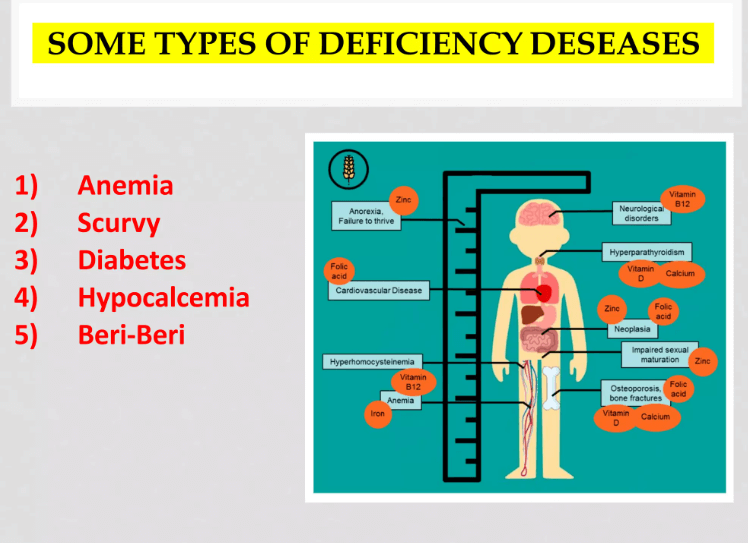
- Diseases that occur due to a lack of nutrients (Vitamins and Minerals) over a long period are called Deficiency Diseases.
- A deficiency of different Vitamins and Minerals may also result in certain diseases and disorders.
- All deficiency diseases can be prevented by taking a balanced diet.
- Our meals have a balance of the different nutrients needed by the body.
Deficiency Diseases of Vitamins
There are various deficiency diseases related to different kinds of Vitamins. These vitamin deficiency diseases occur when there is an insufficient intake of specific vitamins. They are as follows-
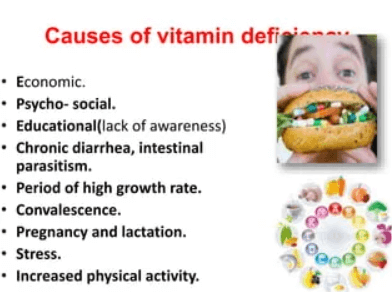
| Name of Vitamin | Deficiency Diseases |
| Vitamin A (Retinol) | Loss of Vision (Blindness) |
| Vitamin B1 (Thiamine) | Weak muscles and severe weight loss (Beriberi) |
| Vitamin B2 (Riboflavin) | Poor diet and mouth sores (Ariboflavinosis) |
| Vitamin B3 (Niacin) | Diarrhea and Dermatitis (Pellagra) |
| Vitamin B5 (Pantothenic acid) | Ischemic attacks and multiple sclerosis that affect the brain (Paresthesia) |
| Vitamin B6 (Pyridoxine) | Low number or lack of Red Blood Cells (Anemia) |
| Vitamin B7 (Biotin) | Red and Itchy skin (Dermatitis) |
| Vitamin B9 (Folic Acid/Folate) | Immature RBCs (Megaloblastic Anemia) |
| Vitamin B12 (Cyanocobalamin) | Abnormal absorption in the small intestine (Pernicious Anemia) |
| Vitamin C (Ascorbic Acid) | Bleeding gums and swollen joints (Scurvy) |
| Vitamin D (Calciferol) | Weakening of bone near joints (Rickits) |
| Vitamin E (Tocopherols) | Faster depletion of RBCs from the body (Hemolytic Anemia) |
| Vitamin K (Phylloquinone) | Excessive Bleeding |
Deficiency Diseases of Minerals
Deficiency diseases related to minerals are often caused by an inadequate intake of essential minerals. It is very important to maintain a balanced and varied diet to ensure you’re getting the necessary minerals to prevent these deficiency-related conditions.
| Minerals | Deficiencies |
| Calcium | Weakens bone strength and teeth, loss of muscle coordination leads to osteoporosis |
| Phosphorous | Poor body growth, weak bones, and teeth |
| Sodium | Nervous depression, improper muscle contraction, loss of Na+ in urine, dehydration. |
| Potassium | Poor muscle control leads to paralysis and nervous disorder. |
| Magnesium | Heart and Vascular irregularities, dilated blood vessels, and loss of coordination |
| Chlorine | Vomiting and hypochloremic alkalosis |
| Iron | Anaemia and Skin Problems |
| Iodine | Goiter, Thyroid, Gigantism, and Dwarfism |
| Fluorine | Dental Cavities |

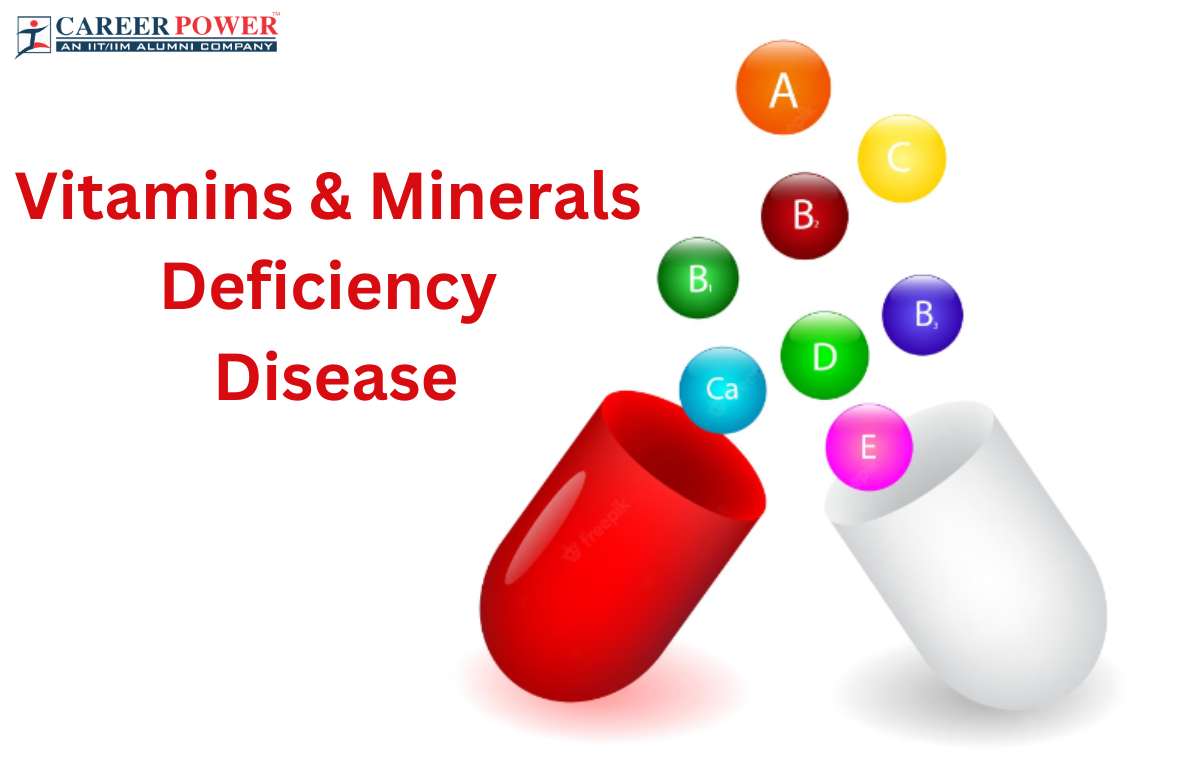

 50 Vegetables Name for Kids in English a...
50 Vegetables Name for Kids in English a...
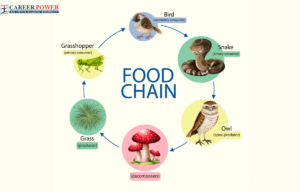 Food Chain: Definition, Types, Examples,...
Food Chain: Definition, Types, Examples,...
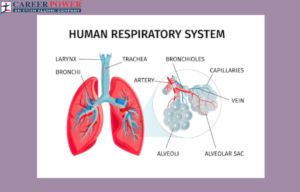 Human Respiratory System: Definition, Di...
Human Respiratory System: Definition, Di...













